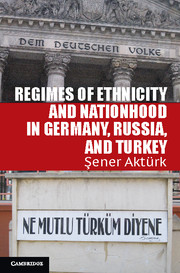Book contents
- Frontmatter
- Contents
- List of Tables, Figures, Graphs, and Maps
- List of Abbreviations
- Acknowledgments
- Part I Theoretical Framework and Empirical Overview
- Part II Germany
- 2 The Challenges to the Monoethnic Regime in Germany, 1955–1982
- 3 The Construction of an Assimilationist Discourse and Political Hegemony
- Part III Turkey
- Part IV Soviet Union and The Russian Federation
- Part V Conclusion
- Bibliography
- Index
- References
2 - The Challenges to the Monoethnic Regime in Germany, 1955–1982
Published online by Cambridge University Press: 18 December 2014
- Frontmatter
- Contents
- List of Tables, Figures, Graphs, and Maps
- List of Abbreviations
- Acknowledgments
- Part I Theoretical Framework and Empirical Overview
- Part II Germany
- 2 The Challenges to the Monoethnic Regime in Germany, 1955–1982
- 3 The Construction of an Assimilationist Discourse and Political Hegemony
- Part III Turkey
- Part IV Soviet Union and The Russian Federation
- Part V Conclusion
- Bibliography
- Index
- References
Summary
“Germany is not a country of immigration.”
Commission of the Federation and the States, 1977“The apparently large number of migrants who are willing to stay in the Federal Republic…must be offered unconditional and permanent integration.”
Kühn Memorandum, 1979Only six years after the establishment of the postwar Federal Republic of Germany (FRG) in 1949, Germany signed the first treaty for foreign labor recruitment with Italy in 1955. Similar treaties with Greece, Spain, Portugal, Turkey, Yugoslavia, Tunisia, and Morocco followed. Foreign labor recruitment permanently and dramatically altered the ethnic demography and identity politics of the FRG, with its social, cultural, and political consequences still unfolding well into the twenty-first century.
This chapter presents the arrival of foreign workers in Germany, also known as the “guest workers” (gastarbeiter), starting in the mid-1950s, and the social and political challenge they posed to Germany's ethnicity regime, within the theoretical framework presented in the previous chapter. The initial recruitment of foreign workers from the mid-1950s to the late 1960s under the leadership of the Christian Democratic governments and, more importantly, the motivations and reformist tendencies of the Social Democratic Party-Free Democratic Party (SPD-FDP) coalition government that ruled from 1969 to 1982, are examined in detail. The analysis is geared toward explaining the failure to reform the citizenship law during thirteen years of SPD-FDP government, which is the key empirical puzzle in the 1955–82 period.
- Type
- Chapter
- Information
- Publisher: Cambridge University PressPrint publication year: 2012



